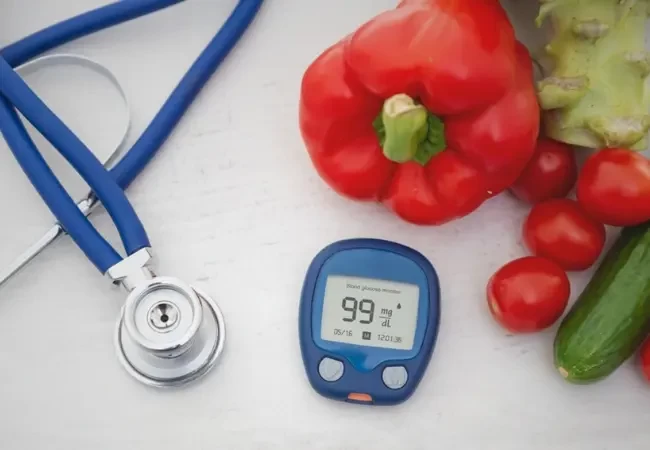Blog
Thyroid vs. Diabetes:
The Common Risk Factors

Thyroid vs. Diabetes: The Common Risk Factors You Shouldn't Ignore
Diabetes has become a growing global burden for families, individuals, and countries. As per reports, 3 in 4 adults with diabetes are those who are living in low- and middle-income countries. Thyroid disorders have also become very common, especially in women. Thyroid disorders and diabetes are both metabolic disorders and hormone-related conditions that affect millions of people worldwide. While they are separate diseases, research shows a strong connection between them. This is especially seen in people with type 2 diabetes. Both the thyroid gland and pancreas play a key role in regulating metabolism and energy production. Any imbalance in thyroid hormones can impact blood sugar levels. This makes diabetes management more difficult. In this blog, let’s discuss the link between diabetes and hyperthyroidism, risk factors, etc.
Types of Diabetes and Hyperthyroidism
Diabetes is a chronic condition that affects how the body processes blood sugar (glucose). According to the International Diabetes Federation, 1 in 8 adults will be living with diabetes by 2045. Around 537 million adults (20-79 years) are diabetic. As mentioned before, the people living with diabetes around the world is about to rise. As per projections, it may increase to 643 million by 2030 and 783 million by 2045.
The two main types of diabetes are:
- Type 1 Diabetes: An autoimmune disorder where the body attacks insulin-producing cells in the pancreas. The key contributors for type 1 diabetes are not as clear as in the case for prediabetes and type 2 diabetes. The known factors for type 1 diabetes include family history with type 1 diabetes as well as age. Though type 1 diabetes can be caused at any age, it usually develops in children, teens, or young adults.
- Type 2 Diabetes: A condition where the body becomes resistant to insulin or doesn’t produce enough of it. The risk factors for the rise in type 2 diabetes include urbanisation, an ageing population, decreasing physical activity levels, and increasing overweight and obesity.
There are some studies that suggest that thyroid issues and blood sugar levels are closely related, especially in type 2 diabetes patients. People with type 2 diabetes are more likely to develop hypothyroidism (underactive thyroid). At the same time, hyperthyroidism (overactive thyroid) can also impact blood sugar control but is less common in diabetics.
Thyroid Issues and Blood Sugar Levels
The thyroid gland produces hormones (T3 and T4) that regulate metabolism. When these hormones are imbalanced, they can disrupt glucose metabolism and insulin function.
Hypothyroidism and Blood Sugar
Leads to insulin resistance and make it harder for cells to absorb glucose.
It may contribute to higher blood sugar levels. This can increase the risk of type 2 diabetes.
Slows down metabolism. This will lead to weight gain, which can be a key risk factor for diabetes.
Increased insulin breakdown can lead to low blood sugar (hypoglycemia). These can cause fluctuations in blood sugar and make diabetes management more challenging. The speeding up of metabolism can contribute to weight loss. As a result of this, it may temporarily improve insulin sensitivity. But the problem is that it can create long-term instability.
Metabolic Disorders and Hormones
Several factors increase the risk of developing both thyroid conditions and diabetes:
- Genetics and Family History
A family history of either condition raises the likelihood of developing it. Some genes are linked to both diabetes and autoimmune thyroid disorders. - Autoimmune Conditions
Type 1 diabetes is an autoimmune disorder, and individuals with it have a higher risk of autoimmune thyroid diseases like Hashimoto’s (hypothyroidism) and Graves’ disease (hyperthyroidism). - Age and Gender
Women are more likely to develop both diabetes and thyroid issues, especially after the age of 50. - Obesity and Insulin Resistance
Excess weight contributes to insulin resistance, which can trigger type 2 diabetes and thyroid dysfunction. - Inflammation and Hormonal Imbalance
Chronic inflammation can lead to thyroid dysfunction and impaired insulin function.
Hormonal changes (such as pregnancy or menopause) can also impact both conditions.
Why Managing Both Conditions is Important
Since thyroid issues and blood sugar levels are interconnected, managing both conditions effectively can:
- Improve overall blood sugar control.
- Reduce the risk of diabetes complications like nerve damage and heart disease.
- Help maintain a healthy weight and metabolism.
- People with diabetes should get their thyroid function tested regularly.
- Those diagnosed with a thyroid disorder should monitor their blood sugar levels, especially if they have risk factors for diabetes.
Lifestyle Changes to Manage Both Conditions
- Balanced Diet
Try to follow a balanced diet including whole foods, including vegetables, lean proteins, and healthy fats. To maintain stable blood sugar levels, you need to avoid processed sugars and refined carbs. Also, include iodine-rich foods like fish and dairy to support thyroid function. - Regular Exercise
Exercise is an important factor. Regular exercise can help improve insulin sensitivity and support healthy metabolism. Moderate exercise like walking, swimming, or yoga is beneficial for both conditions. - Stress Management
High stress can disrupt hormone balance and worsen symptoms. So, it is very important to manage stress. Practice meditation, deep breathing, or hobbies that can be helpful in reducing stress. - Proper Medication & Treatment
If thyroid medication is prescribed, take it as directed to maintain stable hormone levels. Diabetics should work with their doctor to adjust insulin or other medications as needed.
Conclusion
Both thyroid disorders and diabetes affect metabolism and hormone regulation. It is important to stay healthy and informed about health conditions. If you have diabetes, it’s essential to monitor your thyroid function, and if you have a thyroid disorder, be aware of how it may impact blood sugar levels. Silverline Hospital, the best diabetes hospital in Kerala, delivers world-class medical care in diabetes, thyroid, endocrinology and obesity. If you have any concerns about your health, get in touch with Silverline Hospital for proper evaluation and management.

More Blogs
-

Oats Are Also Carbohydrates: Here's Why Protein-Based Foods Are the Better Choice
Think oats are healthy carbs? Discover why protein-based foods are a smarter choice for sustained energy and balanced nutrition.
-

How Vaccines Help Protect Diabetics From Infections
Discover how vaccines protect diabetics from infections by boosting immunity and preventing serious complications.
-

Vaccinations for Diabetics: Flu, Pneumococcal, Tdap & More Explained by Experts
Stay protected with the right vaccines. In this expert-led guide, learn why flu, pneumococcal, Tdap, and other vaccines are essential for people with diabetes.
-

Struggling with Erection or Early Ejaculation? Here's How to Get Help
Struggling with erectile dysfunction or premature ejaculation? Learn common causes, treatments, and how to seek professional help with confidence.
-

When Should Diabetics Eat? Expert Tips on Meal Timing and Blood Sugar Control
Learn how diabetics can optimize meal timing to better control blood sugar. Expert tips for healthier, more balanced living.


 Home
Home  Booking
Booking
 Chat Now
Chat Now  Call Us
Call Us